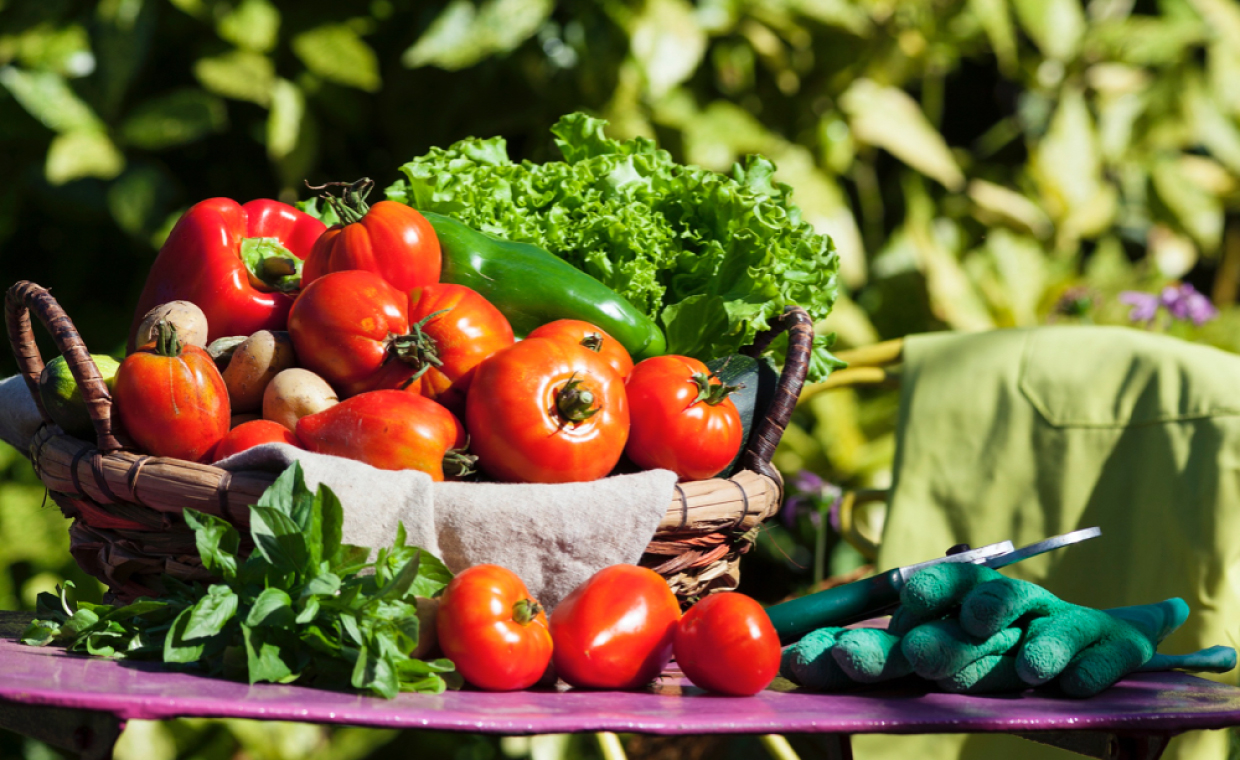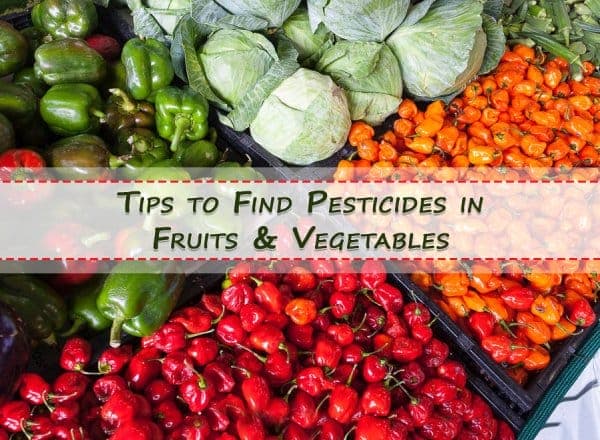
The doctor recommends that you eat fresh and organic fruits and vegetables to lead a healthy life. So, does, a host of articles and online sources. But in today’s world, what does “fresh” or “organic” actually mean? How can you be sure that the vegetables and fruit that you are buying from the market (and at quite high prices, sometimes), have been grown in the right way – organically, without using any pesticides that do more harm than good? So, what is organic food items? Locally produced and organic fruits and vegetables also have environmental benefits when they use fewer fertilizers or pesticides.
Pesticides are very hazardous for organisms as well as for humans. They are also toxic to plants and many food crops including fruits and vegetables that retain pesticide residues despite being washed thoroughly. This article is to make you aware of the poisons that you ingest on a regular basis.
What are Pesticides?
According to ‘Catherine Soanes, Sara Hawker & Julia Elliot’ (Author of Pocket Oxford English Dictionary), Pesticide is a substance for destroying insects or other pests.
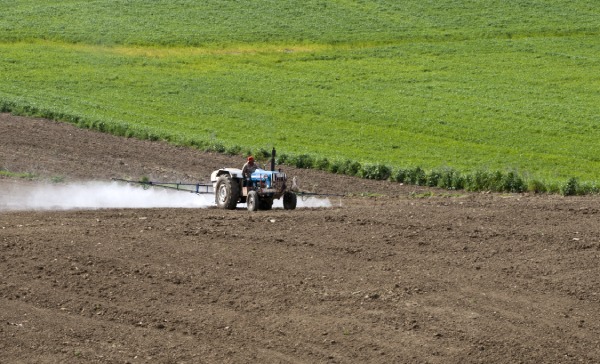
Pesticides protect crops, help in preserving food, and prevent diseases spread by vectors. But they are also toxic, as they are meant to kill, repel, or reduce insects, fungi, rodents, weeds or other bio-organisms that are a threat to the economy and public health. The use of Pesticides in vegetables and fruits in agriculture to protect them from various pests is on rise.
Pesticides Application
The Category of Pesticides are
- Insecticides – These repel insects. For example, organochlorines.
- Herbicides – These are targeted towards weeds. For example, paraquat.
- Fungicides – These protect against mold.
- Rodenticides – These provide protection against mice, rats, moles, and other rodents.
- Fumigants – These are used in vapor form and may be fungicides, rodenticides or insecticides, and are very toxic. For example, cyanide.
- Other pesticides can be miticides for killing moths, algaecides for killing algae, and acaricides for killing ticks.
How do Pesticides Harm You?
Scientific evidence points to the fact that pesticides are linked to many health hazards in human beings, from short-term effects like nausea and headaches to more chronic effects like reproductive damage, cancer, and disruption of endocrine functions. It can also cause severe damage to skin, nerves, eyes, and cause tiredness and systemic poisoning which often leads to fatality.
The result of pesticide residues that we get from the intake of vegetables and fruits can cause chronic health issues can stretch on for a very long time. Some types of cancers like bone, breast, lymphoma, prostate, ovarian, liver and testicular cancer are caused by pesticides.
There is increasing evidence that pesticides have a disruptive effect on our endocrine system, disturbing the regulation of hormones, embryonic development, and the reproductive system. Disruption of the endocrine system can lead to infertility and several births and developmental defects in babies, like imbalance of hormones, and sexual development that is incomplete.
Children are especially susceptible to health hazards from pesticide usage. The human brain is not fully formed until the age of 12, and exposure to common pesticide residues in fruits and vegetables from the market can harm the development of the central nervous system.
A safer alternative – organic farming:
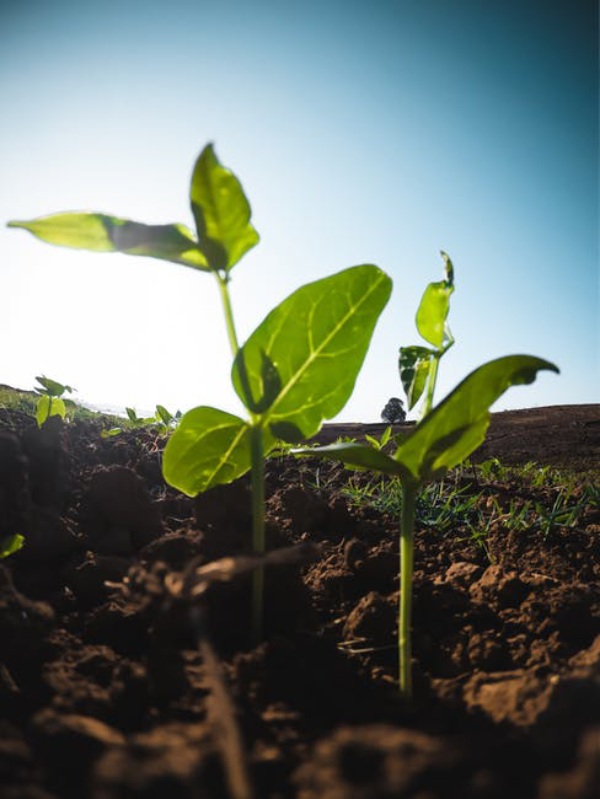
According to ‘Tamil Nadu Agricultural University’ (Published in Organic Farming :: Organic Farming Practices), Organic farming is not exactly a new system but has been followed since ancient times in India. This method of farming cultivates the farming land and grows crops in a way so that the soil is kept alive and in proper health by using organic waste and other biological substances. In other words, human and nature work in harmony to live a peaceful life. Organic waste could be animal, crop, farm, and aquatic wastes. Beneficial microbes or biofertilizers release nutrients to the fruits and vegetables or crops to increase sustainable production in an ecologically friendly environment that is free from pollution.
Organic Farming
The main features of organic farming include the following:
- Protect the soil fertility in the long term by ensuring that organic matter levels are maintained; encouraging biological activity in the soil, and using mechanical intervention with care.
- Using comparatively insoluble sources of nutrients to provide crop nutrients. They are made available to the plants through soil micro-organisms’ activity.
- Using legumes and biological nitrogen fixation to achieve nitrogen self-sufficiency and effectively recycling organic materials like livestock manure and crop residue.
- Use crop rotations, diversity, organic manuring, natural predators, resistant varieties, and minimal biological, thermal, and chemical intervention to implement disease, weed, and pest control.
How to Check?
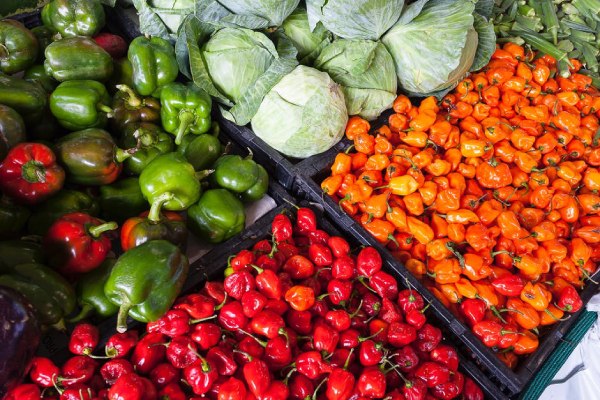
Could we find out Pesticides in fruits and vegetables by visual observation? Let us discuss if that is possible.
Vegetables at Market
01. Too Perfect to be True
Most organically grown vegetables and fruits will have some imperfection or marks of bug bites on them. If you are buying fruits and vegetables that look all shiny and perfect without any defects or marks made by bugs, then you are most probably buying produce on which harmful pesticides and fertilizers have been used liberally. Therefore, if you see some less than perfect and dented vegetables and fruits, do not reject them outright, they might be healthier than the too good to be real pieces.
What the Research Scientist Says?
Like many I always believed that the visual appearance of vegetables and fruits grown or ripend with pesticides in chemicals must have a different colour and other sign that you can identify easily. We contacted ‘Dr. Timbadia’, the Director Extension Department and Research Science of Navsari Agriculture University to clarify the same. He revealed that though experienced of farmers or vendors can identify them form visual observation but there are no scientifically proven methods or ways or characteristics, due to which you can identify such pesticides effected fruits and vegetables just by observation with naked eye. You can find trace of the same through laboratory experiments only. In view of the same our challenges become challenging. Perhaps we are not left with any other option other than relying on labels of sellers who have certification by govt. authorities.
02. The Labels
According to ‘World Health Organization’ (Published in Food Safety: What You should Know), If you are in the habit of buying vegetables and fruits from a hypermarket or a grocery store, then look for labels on the products that say “Organic” or “Certified Naturally Grown”. If the fruits and vegetables do not have any such labels on them, then they have most probably been sprayed with pesticides. The ways of organic farming often involve a cost that the grower or farmer must pay. At the local market, also look for labels that say “Certified Naturally Grown” to get those health and organic vegetables and fruits for your kitchen.
03. Testing at Home
If you want to be sure that the fruits and vegetables you bought are free of pesticides, you can use an insecticide test kit. This kit contains the following:
- Test tubes
- Vials
- An alcohol lamp
- Acetone
- Test strips
- Glass slides
- Eyedroppers
- Colour Chart
- Capillary Tubes
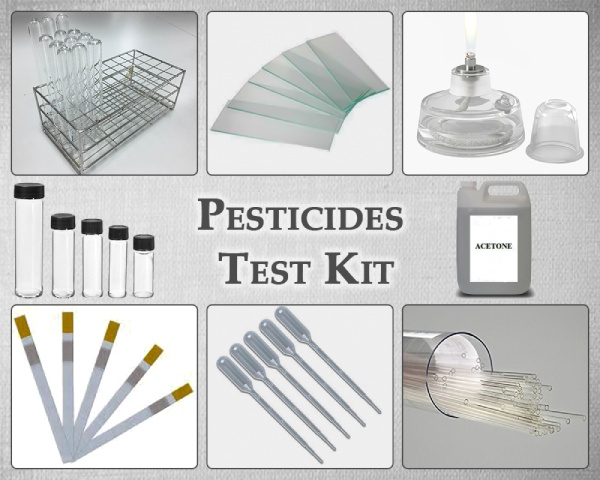
Pesticides Test Kit
To test for pesticide residue:
01. According to ‘Food and Fertilizer Technology Center’ (Empowering agency of small-scale farmers through science and information), you can use insecticide kit to find the presence of insecticides in fruits and vegetables to get an idea of the toxins you are consuming. Let’s see what is the test procedure for checking the insecticides residue Cut a small fruit or vegetable sample (approximately 5 grams) and place it in a test tube.
02. Pour 5ml of acetone (Also used Extract Solution) into the test tube and cap it, then shake the test tube to extract material from the sample.
03. Let it rest for approximately 15 minutes and then take the cap off.
04. Pour this into a vial and hold the vial with tongs over an alcohol lamp (you can use any source in place of alcohol lamp for heating) to heat it, until it reduces to 1/10th of the original amount. Tip: You can use an electrical fan aimed at the vial to make the evaporation faster.
05. Add one drop from the first solution in the insecticide kit to a test strip using an eyedropper and allow it to dry.
06. Dip a capillary tube into the vial that has the concentrated extract and place five drops on the test strip.
07. Use two glass slides and place the test strip in between and hold them over the alcohol flame with tongs for a minute.
08. Allow it to cool for approximately three minutes.
09. Lift the top slide and add a drop from the second test solution in the insecticide kit. It changes colour.
10. Use the colour chart to match the colour with the test strip, and you can find out which insecticide, if any, is present.
It you need to detect residue of pesticides in fruits and vegetables, this test is very easy and fast. To know more about the pesticide residue test, watch this online documentary by RenekaBio Food safety. (It is a company that brings innovative diagnostic and research tools. Their products and services provide cost-effective and accurate tests.)
From our experience and study, we know one company in India named Refresh that specializes in organic food and who have well defined system to monitor the entire farming process cycle with their contract farmers. To know the ecological benefits, Refer: “WITH TIME PEOPLE ARE CHOOSING HEALTH OVER MONEY” Organic food is better for our environment. In future, its environmental impact will surely exhibit.
Conclusion
Pesticides are very hazardous and lethal for organisms as well as for humans. They are also toxic to plants and many food crops, including fruits and vegetables, contain pesticide residues after being washed or peeled. Pesticides decrease the biodiversity in soil and it has been found that the quality of soil is higher in absence of pesticides with the additional effect of higher water retention.
Using a kit can help determine pesticides in fruits and vegetables bought from the market, but if you do not have one, remember to check the fruits for excessive perfection and the correct labelling to identify if you are buying the right kind of organic fruits and vegetables. Eat healthy and stay happy!
Also Read:
Tips to Maintain Your Kitchen Garden This Season!
Awesome Indoor Gardening Supplies You Need for Your Home!
Indoor Plant Care: Tips You Must Know!
Image Courtesy: Image 4(a), Image 4(b), Image 4(c), Image 4(d), Image 4(e)
Author Bio
Indrani Ghosh – In the fourth decade of my life, I decided that I needed something more. I needed to tell everyone my story, but in a way that people would read it. So I have become a part-time writer. My main profession is that of a technical writer and I have been part of the IT industry for 19 years now. I have worked for companies like TCS and Ericsson and clients like Johnson & Johnson, Citi Cards, T-Mobile, Visa, and many more. I love my job and have a great passion for life. My husband is my best friend and he is as passionate about life as I am, though in subtly different ways. I am a loyal friend, a skilled professional, a loving wife and hopefully, soon a published author! I am Easily Reachable on – Facebook, LinkedIn.


